2017/18 funded projects
Supported by KISI funding and the Royal Institute of Philosophy, Dr. Anthony Wrigley (Law), Dr. Sotirios Santatzoglou (Law), Dr. Kirsty Moreton (Law), Prof. Mihaela Kelemen (KMS), Dr. Laura Pritchard-Jones (Law), and Prof. Sue Read (Nursing and Midwifery), organised a one-day, multi-disciplinary conference.
What is the Role of Compassion in Decision-Making when Working with Vulnerable and Marginalised People?”
The conference explored issues and perspectives surrounding the role of compassion when working with vulnerable and marginalised people by bringing together participants from a range of backgrounds, including health and palliative care, social work, justice and the prison service, charity sectors, and academia. The event combined key note papers, round table discussions, and a cultural animation workshop. Following a short introduction on the Aristotelian virtue of compassion by Dr. Anthony Wrigley (Keele University), presentations included key notes from Dr. Marinos Diamantides (Birkbeck College, London), Prof. Roger Smith (Durham University), Dr. Phillipa Tomczak (Nottingham University), Emma Hodges (CEO, St Giles Hospice), Penelope Gibbs (Director, Transform Justice), Dr. Ala Sirriyeh (Liverpool University) and Ayad Al-Ani (MD, London Central Academy). The conference also heard from David Bevan (HMPS Drake Hall), Dr Alex Plasatis (Lead Writer, Writing East Midlands – Refugees and Asylum seekers), Steve Cartwright (Community Palliative Care, Walsall NHS Trust), and Katie Brooksbank (Criminal Justice Community and Diversion Support Worker, Rotherham).
Emeritus Prof. Martin Wasik CBE (Keele University) chaired the morning discussion on addressing theory and Dr. Caroline Bruckner-Holt (Medical Director, Katharine House Hospice) chaired the second theme discussions on compassionate care and institutions. The afternoon discussion on experiences from politics and practice was chaired by Dr. Anthony Wrigley (Keele University) before the day rounded off with all participants – speakers and members of the audience – engaging in the highly anticipated cultural animation workshop. This final workshop was introduced by Prof Mihaela Kelemen (Director of CASIC, Keele University) and facilitated by members of the New Vic theatre, allowing everyone the opportunity to add their own insight into the nature of compassion when working with marginalised and vulnerable people.
The conference was booked to capacity, with some 100 people attending in total. All participants were invited to sign up to a compassion network, allowing the practical, professional and academic expertise gathered together for the conference to form a basis for future work on compassion. The project team are now looking at grant opportunities to fund the network and how to take forward some of the key themes from the conference, such as the relationship between compassion and professionalism; whether compassion can be extended to institutions rather than simply being the response of individuals; and how compassionate practice can facilitate inclusiveness with respect to vulnerable and marginalised people.
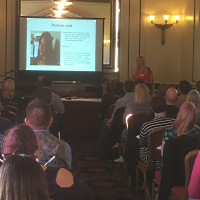
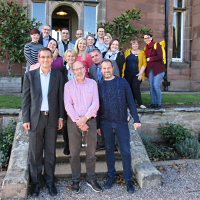
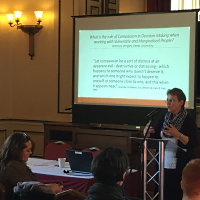
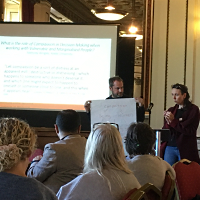
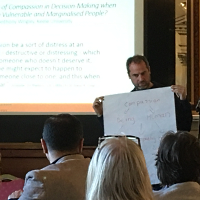

Supported by KISI funding, Dr Aneta Hayes (Keele) and Dr Sylvie Lomer (Manchester University) organised a one day conference titled ‘Internationalisation of Higher Education across Europe: rationales, representations of international students and teaching excellence’.
The conference was held at the University of Manchester, on 7 June 2018.
The conference explored comparative perspectives on internationalisation of higher education across Europe. The central aim of the conference was to identify how different rationales for internationalisation, evolving under conditions of marketisation of higher education, position international students in educational destination countries. Presentations at the conference included two key note papers from Prof Marek Kwiek (Adam Mickiewicz University, Poland) and Prof Terhi-Anna Wilska (University of Jyväskylä, Finland). The conference also heard from Prof Jannecke Wiers-Jenssen (Oslo Metropolitan University), Annette Bamberger and Olga Mun (UCL), Dina Strong (Birkbeck, University of London), Dr Blair Matthews (University of Bristol) and Xuemeng Cao (Warwick University). The team are now working on a special issue focusing on the role of current socio-political perspectives in representations of international students, as well as future opportunities for re-conceptualisation of ‘Who an international student is’ by using perspectives that could distance international students from politicisation of international education.
Following the conference, the project team also met at Keele Hall for a ‘Grant Writing Day’. The aim of this event was to pool together ideas generated at the conference to plan a large grant application.
In June, Professor Ronnie Lippens hosted a brainstorming workshop on the theme of "Psycho-)Analysing the 21st Century". Participants in the workshop were: Dr Mwenda Kailemia, Prof Anthony Kauders, Dr James Hardie-Bick (Sussex), Prof Lynn Froggett (UCLAN), and Prof Dany Nobus (Brunel).
The main aim of the workshop was to see if, from a number of more or less psycho-dynamic and psycho-social perspectives, sense could be made (and if so, to what extent) of this unsettling century of ours which so often feels quite unhinged. The workshop also explored how practitioners in fields such as psychotherapy and counseling could shed light on this theme, based on their professional experience and reflection. As a result, an interdisciplinary "Connectivity and Anxiety Study Group" is now in the making. Focusing on the psycho-social dimension of the contemporary, the group will consist of academics and practitioners from a variety of disciplinary and professional backgrounds.
In June the third of four KISI funded collaborative workshops on shared parenting in post separation/divorce families was held at Keele. The interdisciplinary team including Kirsty Budds, Professor Claire Fox, Professor Alison Brammer, Emma Head, Dr Ed de Quincey and Sandra Woolley, welcomed stakeholders from a variety of organisations including Families Need Fathers, ARCH, and LGBT Foundation, to Keele.
Broadly conceived, GeoHumanities brings together critical engagements with the spatial and arts and humanities disciplines and practices. Many practitioners use participatory methods to arrive at co-produced outputs and a range of forms of knowledge, including exhibitions, creative writing texts, performances, conference papers and journal articles. The network day brought together around 30 academics, practitioners and PGRs from a range of disciplines to discuss possible collaborations and grant bids. The event was structured around a series of papers and workshops, with the latter offered by New Vic Borderlines, Restoke and screendance artist and theorist, Anna Macdonald.










